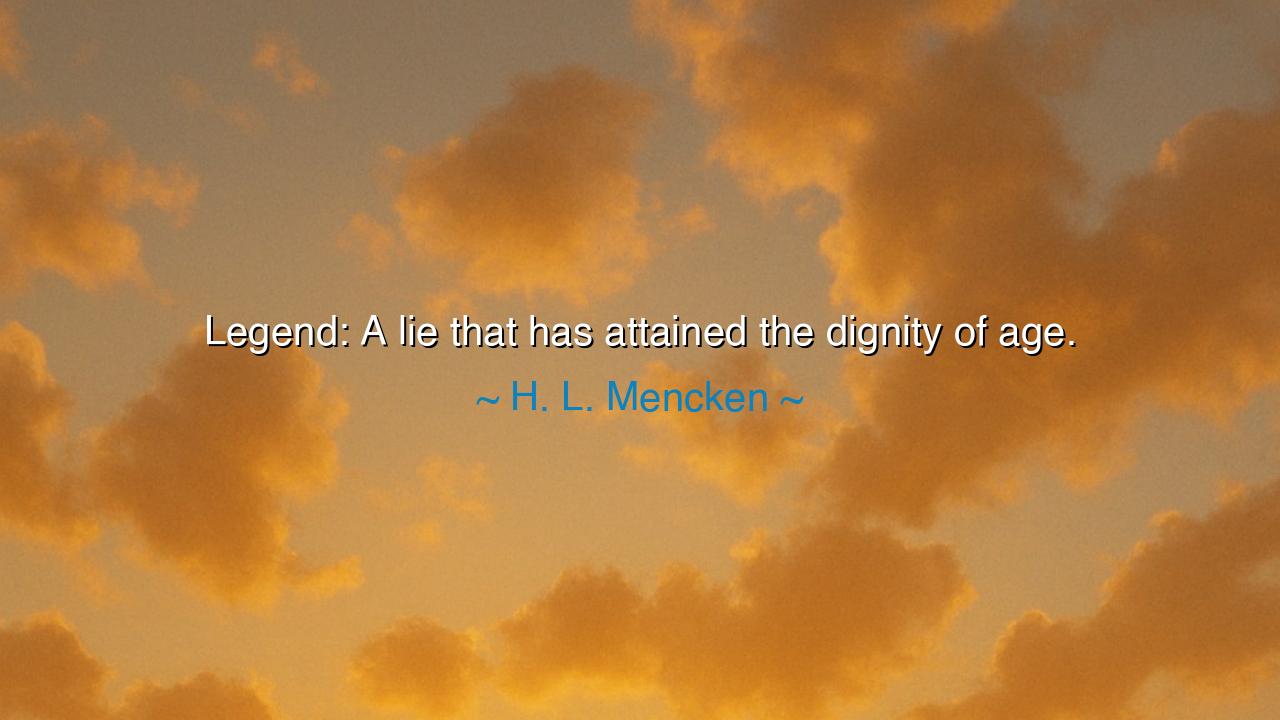
Legend: A lie that has attained the dignity of age.






In the annals of history, where the stories of mankind are passed from one generation to the next, there exists a curious phenomenon: the birth of legends. These tales, woven with truth and embellishment, grow over time, their edges blurred by the hands of mythmakers and storytellers. It is said that H. L. Mencken, a man renowned for his sharp wit and keen insight into the human condition, captured the essence of this process when he remarked, “Legend: A lie that has attained the dignity of age.” In these words lies a profound truth about the way history is shaped, not by the cold facts of the past, but by the narratives that we, as a society, choose to believe.
The creation of a legend begins with a seed—a small event, a fleeting moment, or a great achievement. Yet, as the years pass, this seed is watered by the imaginations of those who retell it. With each telling, the story grows larger, more colorful, more grandiose. What once might have been a simple truth becomes transformed into something greater, something heroic and unattainable. The truth is stretched, and what remains is no longer the factual account of events, but a myth that holds the dignity of age, having been retold so many times that it is accepted as fact. Mencken’s words remind us that legends are often not born from the purity of truth but from the collective desire to elevate the ordinary to the extraordinary.
Consider, for instance, the legend of King Arthur and his knights of the Round Table. The historical Arthur, if he ever truly existed, was likely a far more humble figure than the king in shining armor who now occupies the halls of legend. Yet over the centuries, the tale of Arthur’s bravery, of his magical sword Excalibur and his fabled kingdom, has grown into one of the most celebrated myths in Western culture. What began as the story of a noble leader became an entire legendary narrative—a tale of chivalry, honor, and romance that shaped the way people viewed leadership and heroism. Arthur, once perhaps a warlord in the 5th century, became the immortal king whose exploits transcended history and entered the realm of the divine. The truth of his life was lost to time, replaced by the legend, which, though rooted in reality, is now a far cry from the man who may have once walked the earth.
This transformation of the mundane into the mythical is a process that has played out through history. The story of George Washington and the cherry tree, for example, is one that has come to symbolize the honesty and moral fortitude of the first president of the United States. Though the tale itself is likely apocryphal, it has been passed down for generations as a symbol of Washington’s virtue and integrity. Mencken’s words echo here as well: the cherry tree story, though a lie, has attained the dignity of age, and now, many accept it as part of the truth of Washington’s legacy, when, in fact, it is a myth—a product of the desire to elevate a national figure into something larger-than-life.
In the realm of politics and power, this process can be both dangerous and enlightening. Napoleon Bonaparte, the great French emperor, is the subject of countless legends that paint him as a near-divine figure. The truth of Napoleon, his ambitions, his military genius, and his eventual exile, are far more complex than the glorious tales that have followed him through the ages. Napoleon’s legend is often divorced from the struggles, the failures, and the humanity that shaped him. The lie of his legend, however, has been accepted so deeply that it has obscured much of the reality of his reign, making him a symbol of both greatness and tragic ambition. Through the passage of time, Napoleon has attained a dignity that overshadows the man who lived and died with all the imperfections of a human soul.
So what, then, is the lesson that Mencken’s quote offers to us? It serves as a reminder of the power that stories hold in shaping not only our understanding of the past but also our present reality. Legends are born when the truth is bent to fit our desires, our imagination, or our need for comfort. The truth often becomes secondary to the meaning we attach to it. We must, therefore, approach the stories of the past—whether personal, historical, or cultural—with a critical eye, recognizing that what we call truth may, in fact, be a legend in the making.
Thus, the practical action we must take is this: let us strive to separate the truth from the myth in our own lives, in the lives of those we admire, and in the great stories of history. Let us remember that legends, though beautiful and compelling, are not always the full reflection of the truth. In this way, we can approach the past with the humility of recognizing its complexity, while also understanding the profound influence that legends have on our collective memory. By doing so, we honor the truth, while also acknowledging the human need for myth—a need that, when understood, enriches our lives rather than distorts them.






AAdministratorAdministrator
Welcome, honored guests. Please leave a comment, we will respond soon